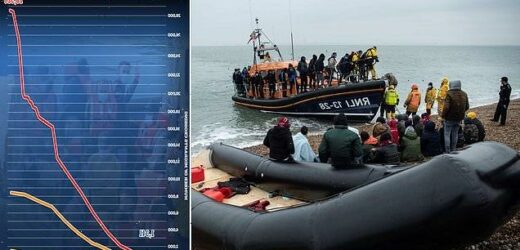UK migrant arrivals last year were 95 times higher than in 2018: More than 28,500 crossed the Channel in small boats compared to just 299 in 2018 – as Home Office releases data for the first time
- Over 28,000 people arrived in UK last year in small boat crossings over Channel
- Home Office data shows the figure was more than three times that of 2020
- 90 per cent of all arrivals were male and three quarters young men aged 18 to 39
- Home Office described crossings as a ‘phenomenon that was rare prior to 2019’
Official figures released for the first time today show 28,526 people arrived in the UK after crossing the English Channel in small boats last year – more than three times that of 2020.
The Home Office statistics, which measured irregular migration for the first time on Thursday, confirming the Government’s official recorded annual totals.
According to the report, last year’s figure compares with 8,466 people crossing in 2020, 1,843 in 2019 and just 299 in 2018.
The data revealed that the total figure for 2021 was even higher than previously anticipated.
Numbers arriving in the UK reached their highest peak in November 2021, when 6,971 small boats arrived in a single month.
November 27 also saw the greatest loss of life in the migrant crisis when 27 people tragically drowned in the English Channel after their dinghy collapsed, including seven women and three children.
Despite highlighting the dangers of crossing the 21-mile Dover Strait in unsuitable craft, migrants continued to arrive in high numbers throughout December.
Migrants pictured next to a boat which had crossed the English Channel at Dungeness, Kent, on November 24, with others helped ashore by a RNLI (Royal National Lifeboat Institution) lifeboat
Home Office data shows the meteoric rise of people crossing the English Channel last year, peaking dramatically in November and December
How many migrants have crossed the Channel from France to the UK since the start of the year?
According to Home Office figures:
January 4 – 66
January 10 – 96
January 12 – 30
January 13 – 271
January 14 – 118
January 15 – 197
January 18 – 168
January 20 – 25
January 23 – 87
January 24 – 67
January 25 – 183
January 26 – 39
February 12 – 11
Total so far: 1,358 migrants reported crossing in at least 46 boats
Around 90 per cent of the people who made the crossing last year were male, according to the Home Office data.
Three quarters of all arrivals were young men aged 18 to 39, with five per cent of arrivals men aged 40 and above.
Just seven per cent of those crossing the Channel were women. Around 12 per cent were children, of which 76 per cent were boys.
Some 30 per cent of the people arriving were Iranian nationals, 21 per cent were Iraqi, 11 per cent were Eritrean and 9 per cent were Syrian.
Iranians ‘represented the vast majority’ of small boat arrivals in 2018 (80 per cent) and 2019 (66 per cent). But a greater mix of nationalities have been recorded since 2020, the Home Office said.
Information on gender and nationality was not available for some arrivals.
There was an average of 28 people on board each boat in 2021 and crossings took place around two in every five days.
A total 1,034 small boats carrying multiple people were detected arriving in the UK in 2021, compared to 641 in 2020, 164 in 2019 and 43 in 2018.
The average number of people on board small boats last year was ‘much higher’ than in 2020, when there were 13. This is compared to 11 in 2019 and seven a year earlier.
Dr Peter William Walsh, senior researcher at the Migration Observatory at the University of Oxford, said the reasons for the rise in small boat arrivals ‘are not yet fully known’ and it is ‘hard to predict how the numbers will change… over time’.
Migrants arrive into the Port of Dover after being intercepted mid channel by the UK Border Force on January 10
He added: ‘A large majority of people crossing the Channel in small boats claim asylum on being brought to the UK.
‘Evidence from around the world suggests that changes in asylum applications are largely driven by developments well beyond UK policymakers’ control, such as crises and violence in other countries.’
The Home Office document described small boat arrivals as a ‘phenomenon that was rare prior to 2019 but has since increased sharply in number’ and made clear this method of travel is only one of a number which could be used to reach the UK border and ‘seek entry without permission’.
It added: ‘It is not possible to know the exact size of the irregular population in the UK, nor the total number of people who enter the UK irregularly.’
A group of people thought to be migrants are brought in to Dover on January 18
Immigration minister Kevin Foster said: ‘This Government is fixing our country’s approach to illegal entry to the UK and asylum by making the tough decisions to end the overt exploitation of our laws and UK taxpayers.
‘We know there is no simple solution to this problem but our New Plan for Immigration will deliver the fair but firm system the British people have repeatedly voted for.’
The Government’s Nationality and Borders Bill, which will make it a criminal offence to knowingly arrive in the UK illegally and introduce life sentences for those who facilitate illegal entry into the country, is currently going through Parliament.
Source: Read Full Article






